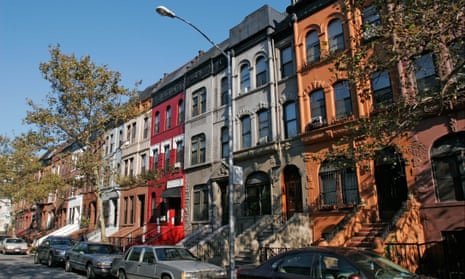Somebody is buying houses in the United States – but it sure isn’t millennials. Just ask their parents. They’ll be the ones worrying in the kitchen about whether their little darlings will ever leave.
Purchases of single-family homes posted a whopping 16.6% jump during April over March’s levels, the largest such one-month gain recorded in more than eight years, and the median price point hit a record $321,100.
Prices and sales should be rising. Mortgage rates remain close to record lows, the private sector created 160,000 new jobs in April – and the national unemployment rate is now only 5%. Even taking into account all the debate over the ways in which that unemployment figure understates the actual rate (and fails to capture underemployment by swaths of the population), that’s not to be sneezed at.
Still, there’s one demographic group that, notably, isn’t touring open houses or scouring online listings in search of their new homes. No prizes for guessing which one.
Yes, far from buying new homes, millennials increasingly aren’t even renting. The proportion of this demographic – aged around 18 to 35 – who end up living with their parents has been on the rise steadily since the Great Recession, peaking at about 36%, according to the Pew Research Center.
Now, for the first time in 130 years, living with your parents has become the most common living arrangement for young men and women aged 18 to 34, Pew reported this week.
No wonder voters are turning, in their millions, to “protest candidates” such as Donald Trump and Bernie Sanders, who promise (in very, very different ways) to upend the economic system as it exists today.
Historically, for the past century or so, American society has tended to favor nuclear family households: mom, dad, kids, dog or cat, etc. You’d head to grandma and grandpa’s for Thanksgiving and other holidays, but you didn’t live there. Even if you lived on a farm and worked it with your family members, you might occupy a separate house, built when you married and established your own household. Adding a very elderly, widowed grandparent to the household when they could no longer live alone was so rare as to arouse astonished comment. Sure, it happened, but rarely.
The Great Recession has torn up the rule book.
Parents lost their jobs, and sometimes their homes, and often saw their retirement savings dwindle or evaporate. Their millennial children may have been able to afford to attend college but probably graduated with a load of debt.
Where will they get the money for a down payment for a house? Their cash-strapped parents probably can’t help. But where will they find the money for the monthly mortgage payments when they have outsize monthly student loan repayments to make?
Even if they didn’t have student loans to deal with, the affordability problem remains. In those markets where prices have soared, making buying a home problematic even for millennials’ older and more solvent peers, buying even a closet is simply out of the question. Apartment List, an online rental marketplace, ran some numbers and calculated that it would take an average of a decade for millennials to come up with the required 20% down payment to buy a home in the dozen or so most in-demand urban locales.
San Francisco distorts those results, of course: based on average starter home prices and average millennial savings rates, they’d have to save for 28 years before being able to buy their first home. (By that time, of course, they’d probably be worrying about financing their children’s college tuition and just wouldn’t bother.)

While millennials routinely answer polls as to why they aren’t buying homes (or making other big consumption decisions) by saying that they are waiting until they get married, or until they can afford it (whenever that might be), what is just as striking in the Pew Research study’s results is the explosion in the category referred to as “other living arrangements” to a level also not recorded since 1880.
This is a category that Pew defines as sharing space with a grandparent, a sibling, a roommate or housemate, or living in some kind of other shared space, like a college dormitory. Instead of venturing off to live independently, or pairing up (married or just cohabiting), more than half of all millennials now opt for some kind of “untraditional” living relationship once they reach adulthood, sharing their living space with a non-partner.
It’s no surprise that the cities with the biggest affordability problem have been those to see the biggest boom in “adult dorms”, or “co-living” projects, in which residents have their own small rooms (sometimes shared) and then large, common spaces, such as kitchens and living rooms. Think of a cooler, millennial version of Friends.
One way or another, this is a challenge to the status quo. Politically, it serves as a constant reminder that “business as usual” simply isn’t good enough any longer. Free tuition? (Forget for a moment the risk of unintended negative consequences, ranging from subsidizing wealthy students’ tuition to the fact that there will be no incentive for students to graduate on time; university students in tuition-free Germany take, on average, until they are 26 to complete an undergraduate program.) Well, why not? That’s just the most obvious of the populist proposals put forth by this year’s presidential candidates who argue that the system itself is so flawed as to be in need of scrapping – Donald Trump and Bernie Sanders.
It’s also a challenge to corporate interests. For every business that figures out a way to cater to this new way of living – millennials won’t own cars, so Uber and Zipcar will thrive; millennials won’t buy homes, so co-living projects such as those developed by WeWork might be the model of the future, not suburban developments of semi-detached houses – scores won’t.
What, for instance, will happen to Home Depot if every millennial couple doesn’t have their own kitchen to remodel because they’re still sharing one with a bigger family unit or a group of their peers? What if, after yearning for one in their early 20s, they realize that they have existed just fine with their bikes and the occasional Zipcar rental and decide not to add to the air pollution haze?
And what if – gasp – they decide they actually like their current living arrangements and choose to find a way to remain in them, even when their economic position becomes less strained? This is, after all, the generation turning out in droves to support Sanders, and refusing to accept the political status quo. Why accept the economic status quo?
Before you say, pshaw, it will never happen, stop and think. It already has, about four decades ago, when baby boomers – the last generation of this size – took both the political and the economic status quo, turned it on its head and shook it. The catalyst for what is happening today is quite different – an economic crisis rather than a war – but it’s far from impossible that the combination of political and economic stressors could end up creating radically new rules of the road.

Comments (…)
Sign in or create your Guardian account to join the discussion